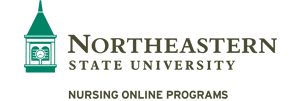As patients, we all want the best possible outcomes for our health. If one thing could significantly improve the quality and safety of care, we would want to be sure we had access to it. This is what the push to hire more BSN nurses is all about.
Hospitals are hiring more BSN nurses based on research that links higher levels of nurse education to better patient outcomes. With the increasing demand for BSN-prepared nurses, now is the time for RNs with an associate degree or diploma to take the next step in their education.
The online RN to BSN program at Northeastern State University (NSU), for example, prepares RNs with the advanced competencies they need to improve patient outcomes. From current nursing issues in today’s changing healthcare environment to leadership and management skills, the essentials of professional nursing practice are covered in NSU’s coursework.
Why the Push for BSN-Prepared Nurses?
Aspiring RNs have more than one way to go after their career goals. If both BSN and associate-degree graduates take the same licensure exam, does the degree really make a difference? Studies show that it does. As a result, a growing number of hospitals now prefer or require their nurses to have a BSNs.
Change is happening at the state level as well. New York State signed the “BSN in 10” law into effect in 2017. RNs graduating from associate degree or diploma programs in the state must earn their BSN within 10 years of initial licensure. More states are moving toward similar legislation.
Dr. Linda Aiken, PhD, RN, FAAN has spent plenty of time researching the link between nurse education and patient outcomes. A 2003 study found that a 10% increase in the proportion of nurses with BSNs decreased the risk of patient death and failure to rescue by 5%.
In a fact sheet on the impact of nursing education, the American Association of Colleges of Nursing (AACN) sums up similar findings from studies that link nurses with a bachelor’s degree to better patient outcomes:
- Increasing the proportion of BSN-prepared nurses on hospital units by 10% was linked to a nearly 11% reduction in the risk of patient mortality.
- For patients with complications, a 10-point increase in the percentage of RNs with BSNs was associated with 7.47 fewer deaths per 1,000 patients.
- Hospitals with a greater percentage of nurses with BSNs or higher had lower rates of congestive heart failure mortality, decubitus ulcers, failure to rescue and postoperative deep vein thrombosis. They also had shorter stays.
- Increasing care provided by BSNs to 80% significantly lowered readmission rates and reduced the length of stay, which in turn resulted in cost savings.
How Can a BSN Education Prepare Nurses to Make a Difference?
All new nurses take the NCLEX-RN licensing examination. As the AACN points out, this multiple choice test measures the minimum technical competency for entry into the nursing profession. What the exam does not show are the differences in preparation between the types of entry-level nursing programs.
Associate nursing programs tend to focus on clinical skills. But a BSN education places an emphasis on topics such as evidence-based practice and nursing leadership and management.
One way to assess the benefits of a BSN is to ask nurses directly about their educational preparedness. Dr. Maja Djukic and her colleagues did just that to identify quality and safety educational gaps between ADN and BSN graduates.
The study looked at 16 quality and safety topics with two cohorts of new nurses (2007–2008 and 2014–2015). In each cohort, BSN graduates reported being significantly better prepared than their associate degree counterparts. Findings include:
- In the 2007–2008 cohort, BSN graduates reported being significantly better prepared than ADN grads in five of 16 topics.
- In the 2014–2015 cohort, the number of educational gaps more than doubled, with BSN grads significantly better prepared than ADNs in 12 of 16 topics.
Topics that BSNs reported significantly better levels of preparedness include:
- Evidence-based practice (EBP)
- Data analysis
- Use of quality improvement (QI)
EBP and QI, the authors note, are particularly important when it comes to reducing health disparities in certain groups, such as rural populations.
An earlier study showed similar differences in BSN and ADN programs. Led by nursing professor Sharon Kumm, MN, RN, CNE, this study found that only 42 of 109 BSN outcomes were met in ADN programs. Evidence-based practice was among the 67 outcomes not met in ADN programs.
As the largest segment of the healthcare workforce, nurses have an unmatched opportunity to play a powerful role in reforming healthcare. To keep up with changing healthcare systems and more complex patient needs, RNs need to achieve higher levels of education. As the research shows, BSN-prepared nurses benefit patients, hospitals and their profession.
Learn more about Northeastern State University’s online RN to BSN program.
Sources:
American Association of Colleges of Nursing: The Impact of Education on Nursing Practice
Robert Wood Johnson Foundation: Building the Case for More Highly Educated Nurses
NCBI: Baccalaureate Outcomes Met by Associate Degree Nursing Programs


